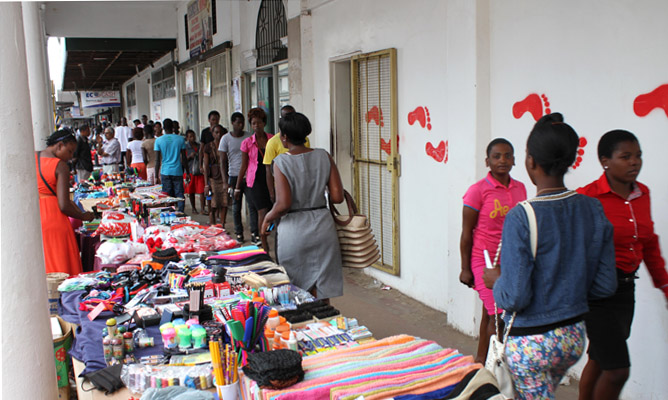
Whoever said Zimbabwe has become a vendor country could not have put it any better. Of course, we will always have politicians trying to make us believe in the normalcy of this as some form of employment, but we know better that it’s not normal when law and engineering graduates have to be selling ice cream and airtime.
Zimbabwe has become a country where person X is trying to sell something to person Y and person Y courting person Z. Companies simply won’t help retrenching or downsizing every month. The organisations soldiering on under the extremely harsh economic climate are indeed hanging on by a thread.
Resultantly, Harare has just, but become one huge flee market starting from the pavements, designated and undesignated open spaces right to the doorsteps of formal grocery shops. Harare’s CBD on its own is estimated to be harbouring over one million vendors. Even more, the number of noisy vendors fighting for customers’ attention astronomically rises as the day wears off worsening the cacophony in the city.
What is happening in Harare was, at some point, back in history, unthinkable; how could civilised people clog the streets and foremost be roasting maize cobs right in the once revered First Street?

Listening to last week’s parliamentary debate on the menace being created by vendors, however, made one wonder whether some of our supposed representatives live in a Zimbabwe apart from the one we know. A picture was painted which made vendors appear like some wild unruly elements bent on senselessly breaking the law.
It portrayed vendors as some rowdy societal malcontents with a penchant for pointlessly causing havoc. Savage remarks were dished out like confetti at a wedding in denouncing the vendors. Indeed, we all desire a cleaner and spacious Harare, yet we also need to stop and reflect on what has thrown the continent’s most literate nation into vending as a major source of livelihood.
Surely, why would fit young men without any disability, with university degrees to cap it all, be selling mineral water at bus ranks? Why would a former bank manager be seen making a living selling second-hand clothes in open spaces? These are just the few telling examples of the “abnormal” things that have become a reality in the country.
- Chamisa under fire over US$120K donation
- Mavhunga puts DeMbare into Chibuku quarterfinals
- Pension funds bet on Cabora Bassa oilfields
- Councils defy govt fire tender directive
Keep Reading
You ask yourself again: Which normal young person would endure some gruelling four or five years in university only to start touting at the bus ranks? Which normal father, worth his salt, would want to condemn himself to a life of petty vending to feed a family of five? The millions of vendors comprise a cross section of society laden with people who should be creatively contributing towards the national fiscus.
But how do they contribute in an environment where opportunities are as scarce as pangolin? Accessing an interview, not to mention a job, long became a rarity for hundreds of thousands of graduates who continue to be churned out of universities. Some left varsity as way back as 2011 yet they can’t find employment to date in a country where the unemployment rate is estimated at close to 90%, according to independent surveys. It’s undeniable, the country’s economic crisis is creeping towards a tipping point.
Now, is this to argue for lawlessness in the form of vendors sprouting everywhere in a capital city? Hardly! We all know and understand the debilitating effects of having vendors mushrooming everywhere as is currently happening from disturbing the natural order of the city to threatening taxpaying businesses. Sure, it is a genuine concern raised by Mashonaland Central Senator Monica Mavhunga on whether the government was putting any mechanisms in place to protect firms that were losing business to street vendors.

Industry and Commerce deputy minister Chiratidzo Mabuwa also threw her weight behind Mavhunga stating that there was need for street vendors to be removed from the streets. Many have joined the attack and echoed the need to eject vendors who are congesting streets among other things. While it is easier for parliamentarians to sit in the comfort of Parliament and say that vendors must go forthwith, it is one thing whether these supposed people representatives understand how survival has become a nightmare for the majority of Zimbabweans.
There is currently very little difference between those who work and those who don’t owing to the delays in salary payments in most organisations. Salaries simply won’t happen in time and most organisations owe employees salary arrears stretching as far back as 2012. Zimbabweans, in particular the vending lot, are a resilient people who, instead of watching their families starve and wait for government to provide scarce jobs, are being responsible.
Against this backdrop, Harare mayor Bernard Manyenyeni’s recent move to tour the city and get on the ground should be lauded as opposed to views ushered from the terraces by people who don’t seem to appreciate the crisis before us. Manyenyeni toured the city recently and interacted with vendors citing that they were not “wild” people and deserved sympathy. “I conclude that they are not wild as some would want us to believe . . . the economy has pushed vendors to these levels,” Manyenyeni said after the tour.
And indeed nothing can be further from the truth; what we are witnessing in Harare is simply a result when an economy is suffocating. These are decent people who won’t resort to crime, but are striving to eke out an honest living.
An amicable solution which looks at the vendor wholesomely as a person deserving of integrity is needed unlike rubbishing them and flushing them out of the streets without an alternative.











